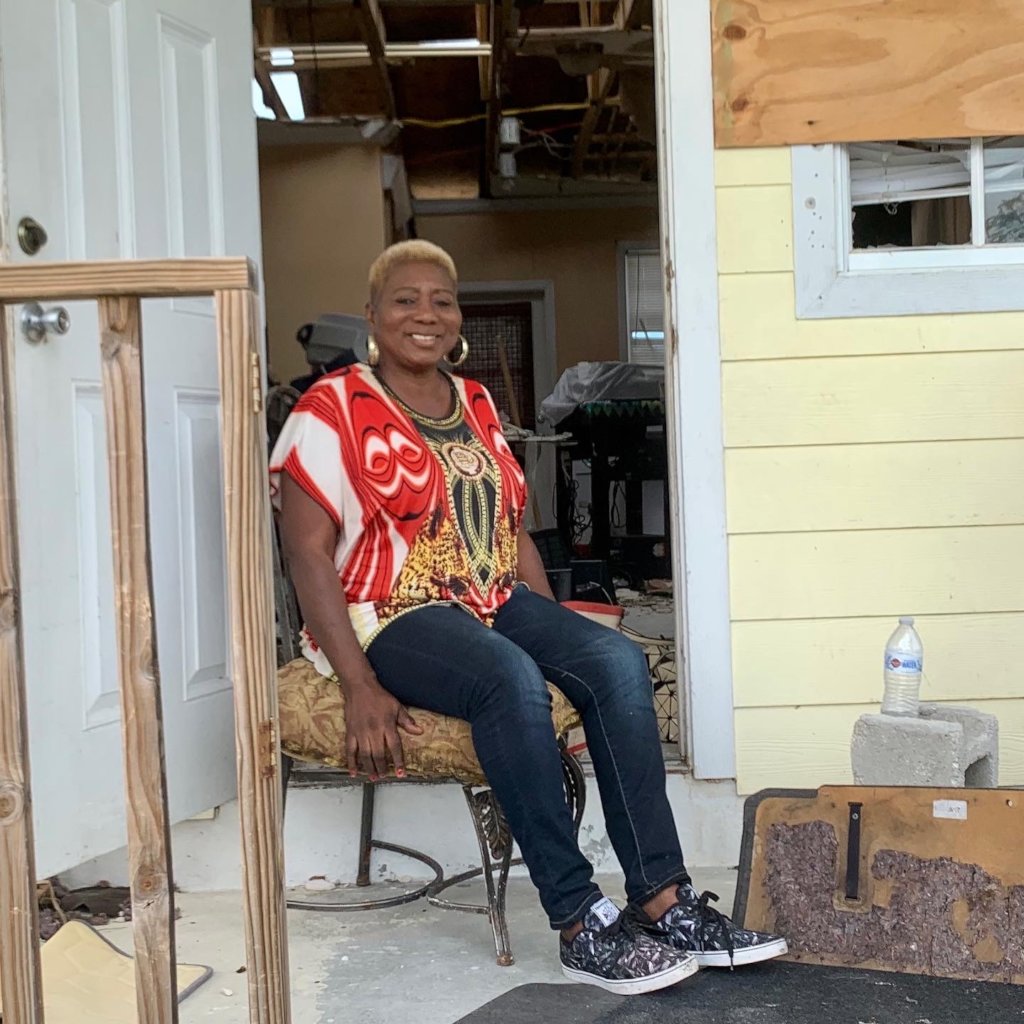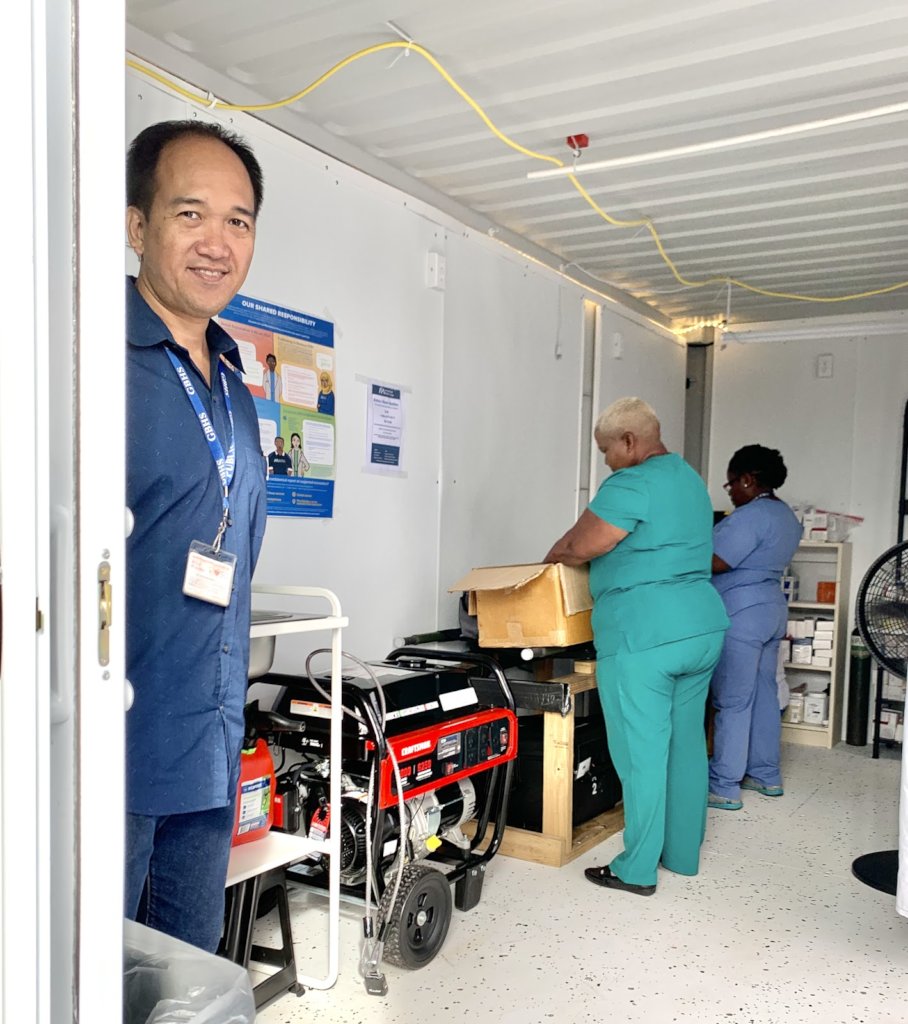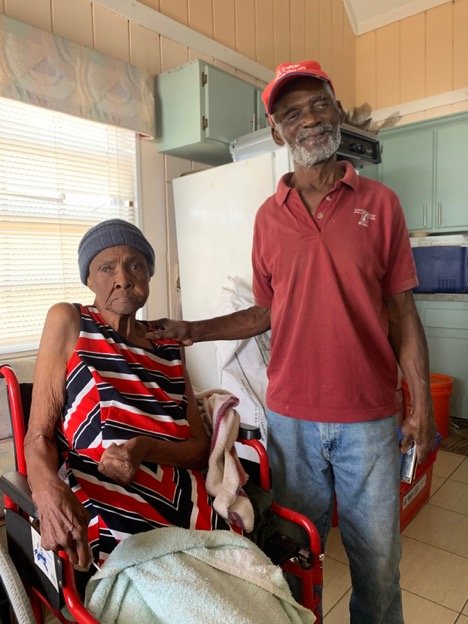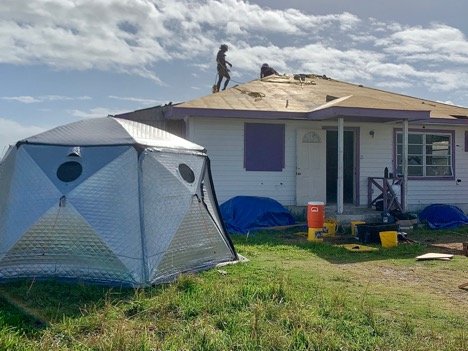By Donna Callejon | Director of GlobalGiving Disaster Recovery Network
On Abaco, Grand Bahama Island, and other out islands, many people still haven’t returned home and regained their livelihoods, four months after Hurricane Dorian. I had the opportunity to speak with some of them—and learn more about how your donations are being put to work—on a weeklong trip to Nassau, Abaco, and Grand Bahama in January. Here are three observations I’d like to share with you:
1. The people of The Bahamas are truly awesome. And resilient.
There’s a lot of talk about resilience these days. And resilience comes in many forms. One form is embodied in a couple of the folks I met during my time on Abaco and Grand Bahama.
As I drove up to a “muck and gut” site, Pleasant, who has recently returned to Abaco from Nassau, sat and watched the contents of her home be piled up in her front yard. Furniture, clothing, kitchen products, and photographs. All had been ruined by the storm surge that reached double-digit depth. Pleasant lost her husband of 36 years when he was swept away. She never recovered his body. But as I sat and heard her stories of the storm, she sat right up in her observation perch and smiled, assuring us that she was never leaving Abaco. She would “do whatever I need to do” to get her family resituated on this cul de sac by the sea.
In preparation for Hurricane Dorian, Neville, a resident of Grand Bahama Island, took his disabled wife, Blossom, from their home along the ocean in High Rock to higher ground in Freeport. For hours, as the water rose to shoulder height in the shelter, he couldn’t locate her and feared that he had lost her. Yet someone had brought his wife to safety on the second floor. A man of unfailing faith, he is repairing his home, caring for Blossom in a borrowed house, and continuing to be a “loyal and humble servant.”
2. The international nonprofit community is critical to recovery.
International organizations that work closely with local community leaders are critically important in the first phases of disaster recovery.
I had the chance to visit with several of these organizations, which have been long-time GlobalGiving partners. As always, they are doing amazing work.
3. There is a significant need for increased social sector capacity in the eastern Caribbean.
Unlike on other Caribbean islands, and in many places around the globe, there is no local community foundation or similar “anchor” organization for the nonprofit sector. But Bahamian nonprofits—which help amplify the voices of the people they serve—are critical to ongoing recovery efforts. There is a clear need for more leadership engagement and governance structures on the islands. This will help the Bahamian social sector take on a stronger, more powerful role in long-term recovery and resilience building.
In the coming months, we will be using some of the contributions you made to assist with this capacity building. A pending grant, for example, will support the convening led by the Organization for Responsible Governance, a Bahamian nonprofit which seeks to “empower civil society and the people to take a greater stake in the governance of the country through generating dialogue and education.”
It is a privilege to lead the GlobalGiving team responsible for stewarding your funds. I hope this update gives you a sense of our work.
Pleasant and Neville are just two of the inspiring Bahamians I had the chance to meet during my trip. I can’t wait to return to see their homes restored completely. Pleasant promises a true Bahamian meal. I’ll be there.
With sincere gratitude,
Donna Callejon + the GlobalGiving Team
Project reports on GlobalGiving are posted directly to globalgiving.org by Project Leaders as they are completed, generally every 3-4 months. To protect the integrity of these documents, GlobalGiving does not alter them; therefore you may find some language or formatting issues.
If you donate to this project or have donated to this project, you can receive an email when this project posts a report. You can also subscribe for reports without donating.
When a disaster strikes, recovery efforts led by people who live and work in affected communities are often overlooked and underfunded. GlobalGiving is changing this reality. Since 2004, we've been shifting decision-making power to crises-affected communities through trust-based grantmaking and support.
We make it easy, quick, and safe to support people on the ground who understand needs in their communities better than anyone else.
They were there long before the news cameras arrived, and they’ll be there long after the cameras leave. They know how to make their communities more resilient to future disasters, and they’re already hard at work. GlobalGiving puts donations and grants directly into their hands. Because the status quo—which gives the vast majority of funding to a few large organizations—doesn’t make sense.
Questions about this project? Contact us



